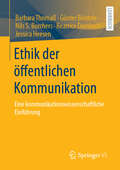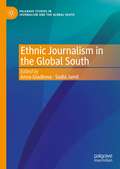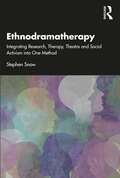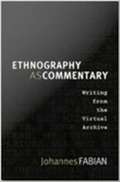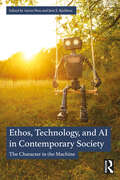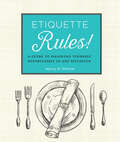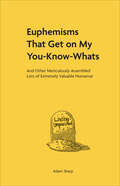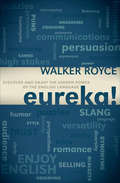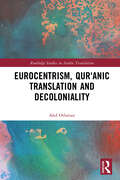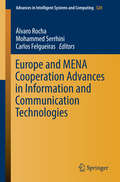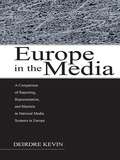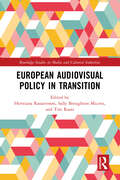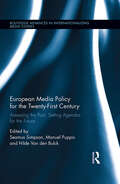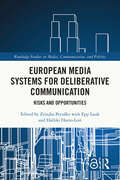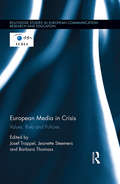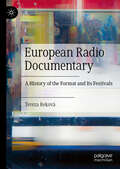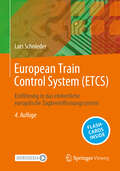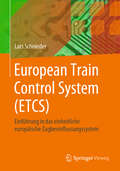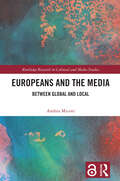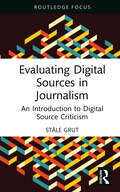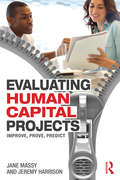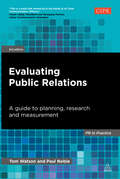- Table View
- List View
Ethik der öffentlichen Kommunikation: Eine kommunikationswissenschaftliche Einführung
by Beatrice Dernbach Günter Bentele Jessica Heesen Barbara Thomaß Nils S. BorchersDas Lehrbuch führt auf kommunikationswissenschaftlicher Grundlage in die Theorie, Methodik und das Leistungsvermögen der Ethik öffentlicher Kommunikation ein. Es wendet die grundlegenden Erkenntnisse ethischer Reflexion auf relevante Berufsfelder der öffentlichen Kommunikation an (Journalismus, Public Relations, Werbung), berücksichtigt aber auch die nicht-professionelle öffentliche Kommunikation im Digitalen. Es liefert Orientierungswissen für künftige (und gegenwärtige) Angehörige dieser Berufsfelder und derer, die an der gesellschaftlichen Kommunikation teilnehmen. Es orientiert sich an der Berufspraxis ebenso wie an begründeten normativen Erfordernissen.
Ethnic Journalism in the Global South (Palgrave Studies in Journalism and the Global South)
by Anna Gladkova Sadia JamilThis book focuses on ethnic journalism in the Global South, approaching it from two angles: as a professional area and as a social mission. The book discusses journalistic practices and ethnic media in the Global South, managerial and editorial strategies of ethnic media outlets, their content specifics, target audience, distribution channels, main challenges and trends of development in the digital age.
Ethnodramatherapy: Integrating Research, Therapy, Theatre and Social Activism into One Method
by Stephen SnowEthnodramatherapy explores the integration of the performance ethnography method, known as ethnodrama, with the principles and practices of drama therapy to establish a sound theoretical formulation for ethnodramatherapy, and considers its use as art, as therapy, as research and as a vehicle for social justice. The book begins by defining ethnodramatherapy – an original synthesis created by the author through deep study and practice of Mienczakowski’s enthnodrama, combined with 35 years of his own practice and research in drama therapy, creative arts therapies and therapeutic theatre. The book describes the origins of ethnodramatherapy, along with its evolution and method. It then delves into applications of the practice highlighted by five case studies with different audiences in different settings. Subjects include adults with developmental disabilities, female adolescents in youth protection, caregivers for loved ones with mental illnesses and Chinese students exploring controversial issues of oppression in China. Complex ethical issues are reviewed and suggestions are made on how to deal with some of the challenging ethical situations that are likely to arise in the ethnodramatherapy process. What emerges is a powerful tool that harnesses theatrical art, ethnographic research and the clinical techniques of drama therapy to create a potential for emancipatory experience for both performers and audiences. This exciting and dynamic synthesis of drama therapy, performance ethnography, theatrical art and social activism will be of interest to the whole community of theatre practitioners and scholars who use theatre to effect individual and social change, including the disciplines of applied theatre, theatre education, experimental theatre, performance studies, and, of course, drama therapy, psychodrama and the other creative arts therapies.
Ethnography as Commentary: Writing from the Virtual Archive
by Johannes FabianThe Internet allows ethnographers to deposit the textual materials on which they base their writing in virtual archives. Electronically archived fieldwork documents can be accessed at any time by the writer, his or her readers, and the people studied. Johannes Fabian, a leading theorist of anthropological practice, argues that virtual archives have the potential to shift the emphasis in ethnographic writing from the monograph to commentary. In this insightful study, he returns to the recording of a conversation he had with a ritual healer in the Congolese town of Lubumbashi more than three decades ago. Fabian's transcript and translation of the exchange have been deposited on a website (Language and Popular Culture in Africa), and in Ethnography as Commentary he provides a model of writing in the presence of a virtual archive. In his commentary, Fabian reconstructs his meeting with the healer Kahenga Mukonkwa Michel, in which the two discussed the ritual that Kahenga performed to protect Fabian's home from burglary. Fabian reflects on the expectations and terminology that shape his description of Kahenga's ritual and meditates on how ethnographic texts are made, considering the settings, the participants, the technologies, and the linguistic medium that influence the transcription and translation of a recording and thus fashion ethnographic knowledge. Turning more directly to Kahenga--as a practitioner, a person, and an ethnographic subject--and to the questions posed to him, Fabian reconsiders questions of ethnic identity, politics, and religion. While Fabian hopes that emerging anthropologists will share their fieldwork through virtual archives, he does not suggest that traditional ethnography will disappear. It will become part of a broader project facilitated by new media.
Ethos, Technology, and AI in Contemporary Society: The Character in the Machine
by Jens E. Kjeldsen Aaron HessBringing together expert rhetorical theorists and technologists, this book explores our current understanding of, and attitudes toward, ethos, credibility, and trust in today’s changing technological landscape.Recent advancements in technology, including the development of digital technologies, the growth of algorithmic machine learning and artifical intelligence, and the circulation of disinformation in social media, necessitate a reevaluation of ethos. To explore the rhetorical concept of ethos, which is the perceived character of a speaker, contributors theorize how ethos is enabled, constrained, and constituted through new communication technologies. In this edited collection, chapters address key philosophical questions concerning the rhetorical capacities of modern communicating machines such as ChatGPT, Midjourney, or other digital platforms. Through case studies, new theorizing, and critical inquiry, contributors contemplate the changing relationship between humans and technology in rhetoric and ethos, revealing contemporary tensions and insecurities regarding issues including authenticity and authorship.This book will be of interest to students and scholars in the fields of Rhetoric, Communication Studies, Technology Studies, Digital Humanities, and Cultural Studies.
Etiquette Rules!: A Guide to Handling Yourself Effortlessly in Any Situation
by Nancy R. MitchelA comprehensive field guide to modern manners, including social skills, phones & social media, the workplace, dining, weddings, and more.Good manners are the hallmark of a well-rounded person, and are a character trait that can benefit one socially and professionally. However, a lot has changed since the first etiquette guides were published almost a century ago, with modern etiquette encompassing so much more than simply being able to identify between a chowder and consommé spoon.To step in and guide readers is Nancy R. Mitchell, who, for more than thirty-five years, has been an etiquette consultant and trainer for numerous institutions and corporations. From revealing the secrets behind successful networking and job interviews, to decoding proper dining habits, to wedding decorum, Etiquette Rules! succinctly gives readers everything they need to successfully maneuver with manners in today’s world.Praise for Etiquette Rules!“An excellent general primer for a young woman entering the workplace.” —The New York Times“In a world where reading news headlines would have you believe it has gone to hell in a hand-basket, it is nice to see someone making the effort to uphold some common civility and manners which, though they might be updated now for same-sex weddings, work cubicles or food trucks, are never out of style.” —DearAuthor.com
Euphemisms That Get on My You-Know-Whats: And Other Meticulously Assembled Lists of Extremely Valuable Nonsense
by Adam SharpEver wondered what the Mandarin word for platypus translates to? Probably not, but it&’s &“duck mouth beast.&” And there&’s more where that came from, thanks to Adam Sharp&’s Euphemisms That Get on My You-Know-Whats, a collection of fascinating, hilarious, and brilliantly odd lists.This book covers just about everything you never knew you didn&’t know, from the noises that animals make around the world to titles of movies that sound dirty but aren&’t—and much more. Whether you revel in trivia, desire more creative ways to curse your foes, or simply enjoy the structure of a good list, you&’ll love the weird genius of Euphemisms That Get on My You-Know-Whats.
Eureka!: Discover and Enjoy the Hidden Power of the English Language
by Walker RoyceLearn the ins and outs of effective written and oral communication through a collection of trivia, puzzles, lists, anecdotes, and practical lessons. Eureka! illuminates the oddities, the amusement, and the communication power to be found in the English language. Instead of highlighting all the mechanics and hairball rules of English, Walker Royce leads you through an educational and entertaining workout of your English knowledge and skills. Provocative insights into high-stakes forms of communication—speaking, coaching, selling, interviewing, and even romance—are mixed with English language trivia, humorous anecdotes, and unique puzzles. His inspiring perspective will transform you into a better listener, writer, speaker, and teammate, and it will stimulate some deeper self-observation—a catalyst for improving your own communications proficiency.
Eurocentrism, Qurʾanic Translation and Decoloniality (Routledge Studies in Arabic Translation)
by Ahd OthmanEurocentrism, Qurʾanic Translation and Decoloniality contributes to the understanding of Eurocentrism in Translation Studies and engages with the concept through the lens of scholarship on Arabic and Qurʾan translation.This book calls for a deeper consideration of Eurocentrism as essential for several debates in the discipline, including its scientific character and future development. It claims that the angle of Arabic and Qurʾan translation is a valuable – and nearly unexploited – area where tensions in translation scholarship can play out in revealing ways. The book also draws connections between Eurocentrism, Qurʾan translation and decolonial thought in order to highlight ‘decoloniality’ as a useful framework for imagining a post-Eurocentric discipline.The book will appeal to scholars and postgraduate students and researchers interested in Translation Studies, particularly within the areas of Arabic, Qurʾanic, Islamic and religious translation.
Europawahlkampf 2019: Zur Rolle der Medien
by Christina Holtz-BachaDer Band versammelt Beiträge, die Befunde aus Untersuchungen zum Europawahlkampf 2019 in und mit den traditionellen und den neuen Medien präsentieren. In Anbetracht des Erstarkens rechtspopulistischer Parteien und des Nationalismus galt die Europawahl 2019 als Schicksalswahl für Europa, was für den Wahlkampf ein besonderes Engagement auf Seiten der Politik wie auch der Medien erwarten ließ. Gegenüber dem Europawahlkampf 2014 kam zudem den sozialen Netzwerken gesteigerte Bedeutung zu, die den politischen Akteuren ein zusätzliches Kampagneninstrument bieten, aber auch den Wahlkampf abseits der öffentlichen Beobachtung ermöglichen.
Europe and MENA Cooperation Advances in Information and Communication Technologies
by Álvaro Rocha Mohammed Serrhini Carlos FelgueirasThis book contains a selection of articles from The Europe, Middle East and North Africa Conference on Technology and Security to Support Learning 2016 (EMENA-TSSL'16), held between the 3th and 5th of October at Saidia, Oujda, Morocco. EMENA-TSSL'16 is a global forum for researchers and practitioners to present and discuss recent results and innovations, current trends, professional experiences and challenges in Information & Communication Technologies, and Security to support Learning. The main topics covered are: A) Online Education; B) Emerging Technologies in Education; C) Artificial Intelligence in Education; D) Gamification and Serious games; E) Network & Web Technologies Applications; F) Online experimentation and Virtual Laboratories; G) Multimedia Systems and Applications; H) Security and Privacy; I) Multimedia, Computer Vision and Image Processing; J) Cloud, Big Data Analytics and Applications; K) Human-Computer Interaction; L) Software Systems, Architectures, Applications and Tools; M) Online Languages and Natural Language Processing N) E-content Development, Assessment and Plagiarism; O) Secure E-Learning Development and Auditing; P) Internet of Things and Wireless Sensor Networks.
Europe in the Media: A Comparison of Reporting, Representation, and Rhetoric in National Media Systems in Europe (European Institute for the Media Series)
by Deirdre KevinEurope in the Media draws together the results of several research projects that examined media coverage of European political and cultural affairs and media representations of Europe. The book attempts to outline some of the important debates regarding European integration and to describe the media landscape in which these debates are informed, reflected, and facilitated. The research presented sought to answer several questions, namely the role of the media in the democratic process at the European level and the extent to which the media contributes to and reflects the process of European integration. The book provides a wide scope of comparative analysis, allowing for an extremely interesting overview of the way that national media systems in France, Germany, Ireland, Italy, the Netherlands, Poland, Spain, Sweden, and the United Kingdom approach the issue of European integration. Based on the news output of over 50 media outlets in eight countries, this book contains the original data gathered by experts during two 1-week monitoring periods, as well as data that was collected and coded by experts with reference to the programming of more than 12 major broadcasters in six countries. This volume addresses debates and analysis from the fields of political science in relation to the process of European integration, EU policymaking and public participation and opinion-formation. It also outlines relevant media theory regarding the relationships between the media and democracy, and the media and identity formation. In this way, the book provides a valuable link between these two separate fields of investigation in an area that is of increasing interest to academics, students, politicians, and journalists.
European Audiovisual Policy in Transition (Routledge Studies in Media and Cultural Industries)
by Heritiana Ranaivoson Sally Broughton Micova Tim RaatsThis book describes and critically addresses the innovations and shifts made in the revision of the Audiovisual Media Services Directive (AVMSD) adopted by the European Parliament and Council in 2018. Reflecting on European Union regulation and policy practice in all its Member States, the book’s unique approach places in-depth case study topics against the broader theoretical background. Taking a Europe-wide angle, an international team of authors focuses on key aspects of the AVMSD: the expansion of its scope to include video-sharing-platforms such as YouTube; the update of the rules for commercial communications; the first attempt for harmonized, minimal requirements at EU level regarding transparency of media ownership; new rules to ensure that video-on-demand services offer, invest in, and prioritise European content; the obligation on television distributors and smart TV manufacturers to pass on broadcasters’ signal without any interference, alteration or modification; and, the formalisation and consolidation of new forms of collaboration among national regulatory authorities. This thorough analysis of the cornerstone of European media policy makes this edited collection a crucial reference for scholars and students of media and cultural industries, media law and policy, European and EU media policy, and technology studies.
European Media Policy for the Twenty-First Century: Assessing the Past, Setting Agendas for the Future (Routledge Advances in Internationalizing Media Studies)
by Seamus Simpson Manuel Puppis Hilde van den BulckMedia policy issues sit at the heart of the structure and functioning of media systems in Europe and beyond. This book brings together the work of a range of leading media policy scholars to provide inroads to a better understanding of how effective media policies can be developed to ensure a healthy communication sector that contributes to the wellbeing of individual citizens, as well as a more democratic society. Faced with a general atmosphere of disillusionment in the European project, one of the core questions tackled by the volume’s contributors is: what scope is there for European media policy that can exist beyond the national level? Uniquely, the volume’s chapters are structured around four key policy themes: media convergence; the continued role and position of public regulatory intervention in media policy; policy issues arising from the development of new electronic communication network environments; and lessons for European media policy from cases beyond the EU. In its chapters, the volume provides enriched understandings of the role and significance of policy actors, institutions, structures, instruments and processes in communication and media policy.
European Media Systems for Deliberative Communication: Risks and Opportunities (Routledge Studies in Media, Communication, and Politics)
by Epp Lauk Zrinjka Peruško Halliki Harro-LoitEuropean Media Systems for Deliberative Communication explores how four dimensions of national media systems – the legal framework for freedom of expression and information, media accountability, journalism and audience media usage and competencies – contribute to or are detrimental to the success of deliberative communication.Drawing on a study of 14 European countries and their media systems, the volume provides comparative and individual perspectives to examine the social consequences of various types of media systems. By using fsQCA (fuzzy set qualitative comparative analysis), the authors relate deliberative communication to the legal framework for freedom of expression and freedom of information, media accountability, journalism and media usage and media competencies. The book shows how different combinations of conditions and contexts figure as risks or opportunities that are detrimental to, or supportive of, deliberative communication, measured with an original index on a European level.This book will interest scholars and students in communication studies, political communication, media and society, media sociology, global media studies, European Studies and journalism.
European Media in Crisis: Values, Risks and Policies (Routledge Studies in European Communication Research and Education)
by Josef Trappel Jeanette Steemers Barbara ThomassWhen the financial markets collapsed in 2008, the media industry was affected by a major slump in advertising revenues, and a formerly highly successful business model fell into a state of decay. This economic crisis has threatened core social values of contemporary democracies, such as freedom, diversity and equality. Taking a normative and policy perspective, this book discusses threats and opportunities for the media industry in Europe: What are the implications of the crisis for professional journalism, the media industry, and the process of political communication? Can non- state and non-market actors profit from the crisis? And what are media policy answers at the national and European level?
European Radio Documentary: A History of the Format and Its Festivals
by Tereza RekováThis book studies the history and significance of radio documentaries in Europe, and the institutions that are specialized on this genre. Focused on the 50-year history of the International Feature Conference (an annual gathering of radio documentarians from around the world), the book discusses the Prix Europa, Prix Italia, the Third Coast International Audio Festival, and the HearSay Audio Arts Festival. The book tells the story of people who chose sound as their lifestyle and who spread their passion worldwide.
European Train Control System (ETCS): Einführung in das einheitliche europäische Zugbeeinflussungssystem
by Lars SchniederDieses Buch ist eine strukturierte Einführung in das europaweit einheitliche Zugbeeinflussungssystem ETCS (European Train Control System). Der Autor führt in die Motivation und Rechtsgrundlagen des ETCS ein. Der Aufbau der unterschiedlichen Ausrüstungsstufen wird dargestellt und die einzelnen Komponenten der Fahrzeug- und Streckeneinrichtung beschrieben. Die umfassende Darstellung der technischen Grundprinzipien des ETCS umfasst sowohl die Sicherungsfunktionen als auch ihre Umsetzung in den unterschiedlichen Betriebsarten. Die Kenntnis dieser technischen Zusammenhänge schafft ein Verständnis, wie ETCS zukünftig einen Beitrag zu einem sicheren, wirtschaftlichen und leistungsfähigen Bahnbetrieb leisten kann.Zusätzliche Fragen per App: Laden Sie die Springer Nature Flashcards-App kostenlos herunter und nutzen Sie exklusives Zusatzmaterial, um Ihr Wissen zu prüfen.
European Train Control System (ETCS): Einführung in das einheitliche europäische Zugbeeinflussungssystem
by Lars SchniederDieses Buch ist eine strukturierte Einführung in das europaweit einheitliche Zugbeeinflussungssystem ETCS (European Train Control System). Der Autor führt in die Motivation und Rechtsgrundlagen des ETCS ein. Der Aufbau der unterschiedlichen Ausrüstungsstufen wird dargestellt und die einzelnen Komponenten der Fahrzeug- und Streckeneinrichtung beschrieben. Die umfassende Darstellung der technischen Grundprinzipien des ETCS umfasst sowohl die Sicherungsfunktionen als auch ihre Umsetzung in den unterschiedlichen Betriebsarten. Die Kenntnis dieser technischen Zusammenhänge schafft ein Verständnis, wie ETCS zukünftig einen Beitrag zu einem sicheren, wirtschaftlichen und leistungsfähigen Bahnbetrieb leisten kann.Zusätzliche Fragen per App: Laden Sie die Springer Nature Flashcards-App kostenlos herunter und nutzen Sie exklusives Zusatzmaterial, um Ihr Wissen zu prüfen.
European Train Control System (ETCS): Einführung in das einheitliche europäische Zugbeeinflussungssystem
by Lars SchniederDieses Buch ist eine strukturierte Einführung in das europaweit einheitliche Zugbeeinflussungssystem ETCS (European Train Control System). Der Autor führt in die Motivation und Rechtsgrundlagen des ETCS ein. Der Aufbau der unterschiedlichen Ausrüstungsstufen wird dargestellt und die einzelnen Komponenten der Fahrzeug- und Streckeneinrichtung beschrieben. Die umfassende Darstellung der technischen Grundprinzipien des ETCS umfasst sowohl die Sicherungsfunktionen als auch ihre Umsetzung in den unterschiedlichen Betriebsarten. Die Kenntnis dieser technischen Zusammenhänge schafft ein Verständnis, wie ETCS zukünftig einen Beitrag zu einem sicheren, wirtschaftlichen und leistungsfähigen Bahnbetrieb leisten kann.Zusätzliche Fragen per App: Laden Sie die Springer Nature Flashcards-App kostenlos herunter und nutzen Sie exklusives Zusatzmaterial, um Ihr Wissen zu prüfen.
European Train Control System: Einführung in das einheitliche europäische Zugbeeinflussungssystem (Essentials Ser.)
by Lars SchniederDieses Buch ist eine strukturierte Einführung in das europaweit einheitliche Zugbeeinflussungssystem ETCS (European Train Control System). Der Autor führt in die Motivation und Rechtsgrundlagen des ETCS ein. Der Aufbau der unterschiedlichen Ausrüstungsstufen wird dargestellt und die einzelnen Komponenten der Fahrzeug- und Streckeneinrichtung beschrieben. Die umfassende Darstellung der technischen Grundprinzipien des ETCS umfasst sowohl die Sicherungsfunktionen als auch ihre Umsetzung in den unterschiedlichen Betriebsarten. Die Kenntnis dieser technischen Zusammenhänge schafft ein Verständnis, wie ETCS zukünftig einen Beitrag für einen sicheren, wirtschaftlichen und leistungsfähigen Bahnbetrieb leisten kann.
Europeans and the Media: Between Global and Local (Routledge Research in Cultural and Media Studies)
by Andrea MiconiThis book investigates the relationship between the process of Europeanization – the expected rise of a common culture – and the role played by the media in the different regions.Drawing on a comparative model, the analysis is structured around frameworks related to the action of the media in shaping national identities; to the world-system theory, based on the hierarchization of geographical spaces; and to the regional patterns identified in scientific literature. The analysis draws on data collected from numerous markets and across a variety of media formats, to detect the geographical pattern that results from the diffusion of different technologies and cultural contents: the national, the regional, the European, and the global.This nuanced and insightful volume will interest students and scholars in the field of communication studies, European studies, and comparative media studies.The Open Access version of this book, available at www.taylorfrancis.com, has been made available under a Creative Commons Attribution-Non-Commercial (CC-BY-NC) 4.0 license.
Evaluating Digital Sources in Journalism: An Introduction to Digital Source Criticism (Routledge Focus on Journalism Studies)
by Ståle GrutBuilding on a rich journalistic tradition of critical source analysis, this book considers the impact of the move from analogue to digital sources on information quality and presents methods and tools to verify information found online and help counter the spread of misinformation. Evaluating Digital Sources in Journalism critically maps the prevalence of online manipulation, particularly images and videos from social media platforms, and considers the tools needed both to carry out and to counter this. Strategies are proposed to help readers evaluate content, context and sources, and ultimately build a foundation for carrying out their own online open-source investigations. The author brings together theories and best practices from a broad range of literature, including modern Scandinavian research on the concept of “source criticism”, journalism and technology studies, advanced forensic verification research, and literature designed for practitioners, including blogs and industry publications. Evaluating Digital Sources in Journalism is recommended reading for advanced journalism students and journalism practitioners.
Evaluating Human Capital Projects: Improve, Prove, Predict
by Jeremy Harrison Jane MassyHow can we be sure that all those projects, programmes and activities that depend for their quality, efficiency and effectiveness on people’s performance have met their objectives? How can we improve the ways in which these projects, programmes and activities are planned so that realistic and useful measurement of their outcomes and value for money becomes possible? How can we produce from these evaluations data of the quality and a standard required to drive future improvement? Evaluating Human Capital Projects addresses these issues for professionals in the private, the public and the not-for-profit sectors. It shows them how to plan and track their investments with the professionalism and discipline widely applied to other capital investments. It is also written as a sourcebook for both professional and Masters-level students in business, health and a wide range of socio-economic disciplines. It addresses effective planning, stakeholder engagement, result-tracking, the identification and removal of barriers to good performance. It provides ideas, theoretical background, extensive references to practice and analysis from the authors’ extensive experience or planning, collection of data, analysis of data and attribution, and reporting to drive future improvement. It is intended to raise the bar on the professionalism with which human capital investments are planned and measured.
Evaluating Public Relations
by Tom Watson Paul NobleOperating under tight budget constraints and with an ever increasing range of tools and technologies to choose from, PR professionals have never been under so much pressure to provide solid, meaningful results and to justify their decisions. Evaluating Public Relations advises PR practitioners at all levels on how to demonstrate clearly and objectively the impact that their work has to their clients and managers. The authors draw on both their practical and academic experience to discuss a diverse range of evaluation methods and strategies and this new edition includes full coverage and advice on the new industry standards on PR measurement. Covering both theory and practice, Evaluating Public Relations is an essential handbook for both students and experienced practitioners.
